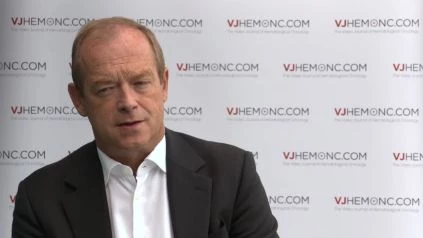Michael Hallek, MD, PhD of the University of Cologne, Cologne, Germany discusses new chronic lymphocytic leukemia (CLL) treatments and FCR (fludarabine, cyclophosphamide, and rituximab) at the 2016 International Workshop of the German CLL Study Group (GCLLSG) held in Cologne, Germany. Prof. Hallek begins by explaining that the current standard of care for some patients that we can genetically characterize, is FCR chemoimmunotherapy. The physically fit patients that have a certain number of genetic alterations, are doing extremely well with FCR; so for these patients it remains a standard. For other patients, FCR chemoimmunotherapy is also applied very often. There are no obvious clear-cut standards and more trials need to be done. An open question is if we need the next-generation sequencing (NGS) in all our patients to understand disease biology and then to go for targeted therapies, or if we can we actually use very potent therapies that do it all? Prof. Hallek believes that some of the new combination therapies are so potent, that for most of the genetic aberrations, they will have a very profound impact and improve the outcome. So, all of the targeted therapies in CLL may not be as relevant as they seem. However, they will be used to study the evolution. He says that there are always exceptions to the good responses. There will be refractory patients and we can look at their leukemic genomes and read at which time point a resistant clone comes up. This will be the future – to follow clonal evolution and to treat it early. He believes that this will have an impact on patients but more time is needed to have longer follow-ups on all the kinase inhibitors and the BCL-2 antagonists in combination. He thinks that monotherapy will not remain standard, but combination therapies of kinase inhibitors and BCL-2 antagonists and antibodies and eventually even some chemotherapy will do the job.
New CLL treatments, the standard of care and the importance of clonal evolution

